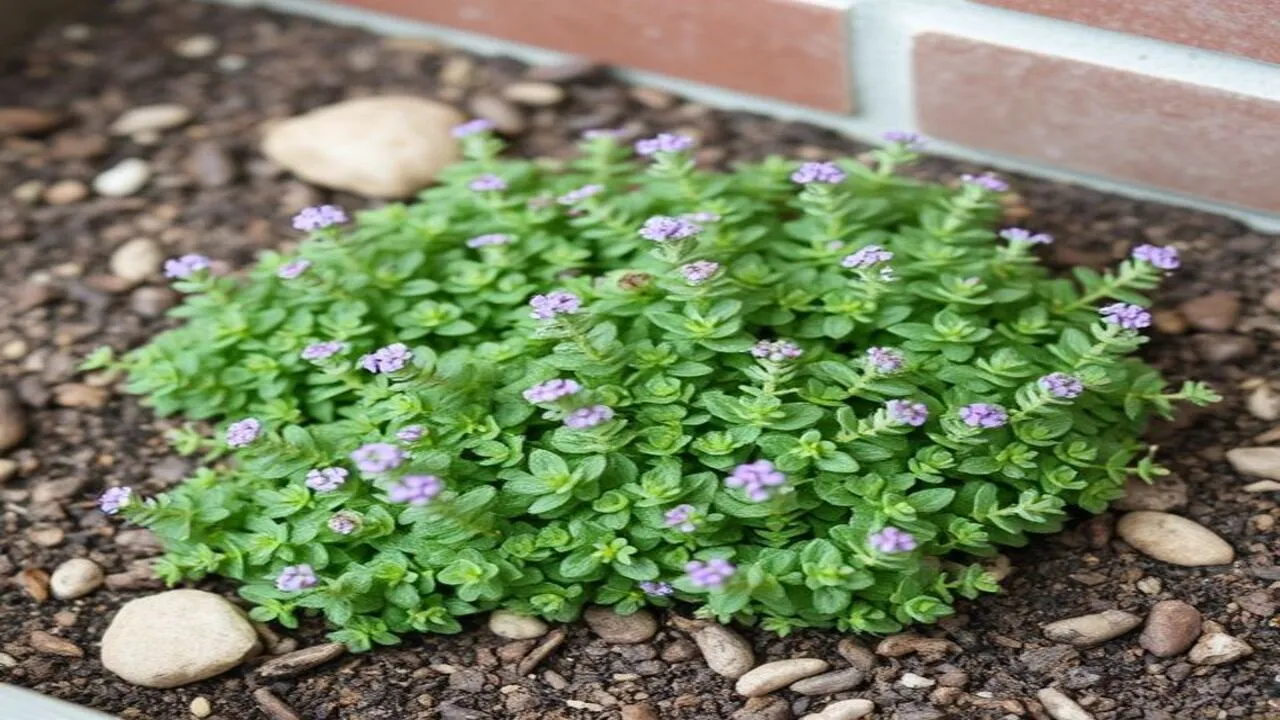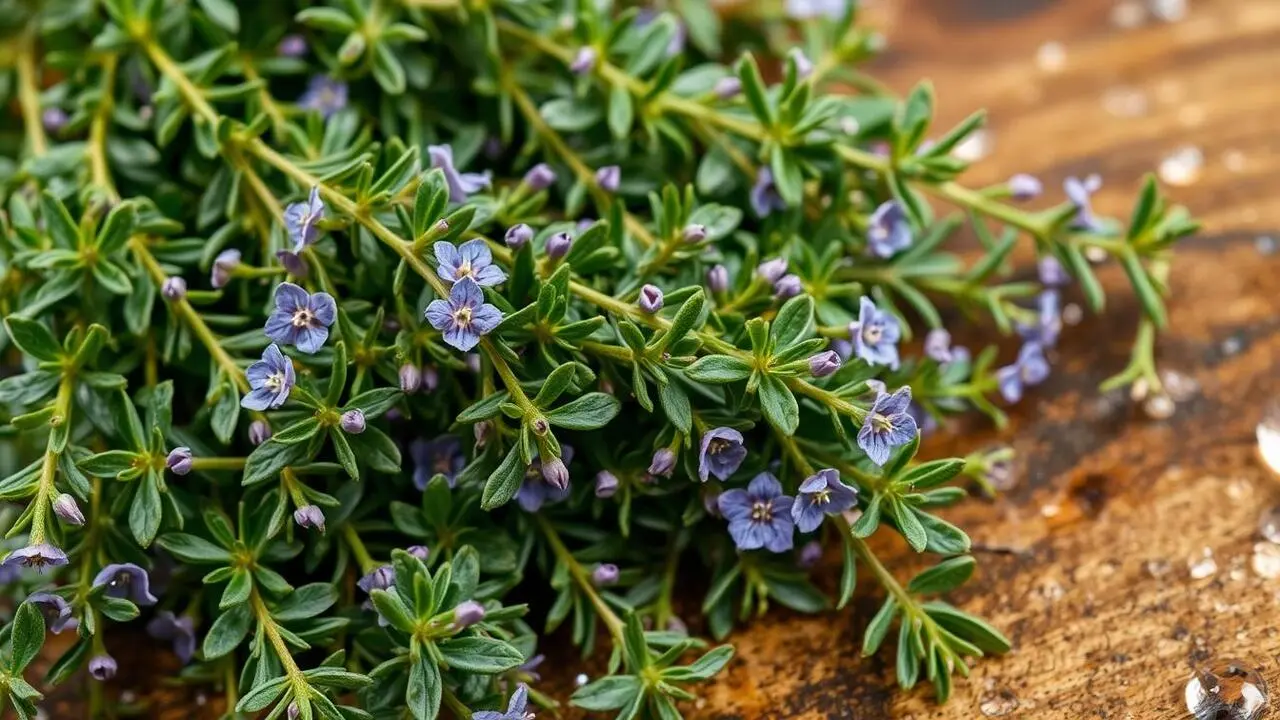In the verdant realm of culinary and medicinal wonders, thyme seeds stand as tiny titans, unlocking many flavors and health benefits cherished for centuries. Imagine a world where these unassuming seeds transform everyday dishes into gourmet experiences, all while bestowing healthful properties upon those who indulge. As we delve into the fascinating universe of thyme seeds, prepare to embark on a journey that uncovers why this humble herb has captured the hearts and palates of chefs and health enthusiasts alike. From their role in enhancing the savory richness of a slow-cooked stew to their subtle, aromatic presence in herbal teas and breads, thyme seeds offer more than just taste—they offer a narrative of nature’s bounty at its finest.
Beyond the kitchen, these seeds hold the secret to respiratory health, providing soothing relief and bolstering lung function in traditional herbal remedies. As we explore the culinary marvels and the health benefits thyme seeds unveil, you’ll discover how to elevate your culinary repertoire while nurturing your well-being with every aromatic bite. So, let’s unlock the secrets of thyme seeds—where culinary artistry meets time-honored herbal wisdom.
The Origins of Thyme Seeds
Thyme seeds, originating from the Thymus vulgaris plant, boast a delightful taste profile, often described as earthy, minty, and slightly lemony. This herbaceous plant features small leaves and produces tiny, potent seeds. Thyme is renowned for its versatile applications, adding depth to a variety of dishes, especially in Mediterranean cuisine.
Culinary enthusiasts appreciate thyme seeds for their ability to elevate soups, stews, and marinades with a unique flavor. Beyond its culinary uses, thyme is valued for its potential health benefits, being rich in antioxidants and having antibacterial properties. Growing thyme seeds is relatively easy, requiring well-drained soil and ample sunlight. Harvesting thyme involves snipping sprigs from the plant and can be used fresh or dried for prolonged storage. Overall, thyme seeds are a valuable addition to any herb garden, offering both culinary wonders and potential health perks.
Culinary Delights: How Thyme Seeds Enhance Flavors
Discover the secret to elevating your dishes with the subtle yet powerful addition of thyme seeds. These tiny seeds hold a treasure trove of flavor-enhancing properties that can transform ordinary meals into extraordinary culinary delights. By incorporating thyme seeds into your recipes, you can unlock a world of intricate and aromatic flavors that will tantalize your taste buds.
Not only do thyme seeds bring a burst of flavor to your dishes, but they also offer a myriad of health benefits. Rich in antioxidants and essential nutrients, thyme seeds can boost your immune system, aid digestion, and promote overall well-being. Whether you sprinkle them over roasted vegetables or infuse them into savory sauces, thyme seeds are a versatile ingredient that adds depth and complexity to any dish.
Exploring the Aromatic World: Thyme Seeds in Herbal Teas and Breads
Thyme seeds are versatile ingredients that add a unique flavor to both herbal teas and bread recipes. When infused in hot water, thyme seeds release a fragrant aroma that instantly relaxes the senses, making them a popular choice in herbal tea blends. Not only do thyme seeds enhance the taste of teas, but they also offer various health benefits, including antioxidant properties and immune-boosting effects.
In baking, incorporating thyme seeds into bread recipes can elevate the overall taste profile by introducing a subtle earthy undertone. The tiny seeds provide a delightful crunch to the bread crust, making each bite a sensory adventure. Whether sprinkled on top for visual appeal or mixed into the dough for a more intense flavor, thyme seeds have been a well-kept secret in the culinary world, waiting to be unlocked for all to enjoy.
Thyme Seeds in Traditional Medicine: Respiratory Health Benefits
Thyme seeds have been extensively used in traditional medicine to promote respiratory health. Rich in antioxidants and anti-inflammatory properties, thyme seeds can help alleviate respiratory issues such as coughs and congestion. These seeds are known to have expectorant properties, making them beneficial for clearing mucus and easing breathing.
Incorporating thyme seeds into your diet not only enhances the flavor of your dishes but also provides numerous health benefits. Whether brewed into a tea or sprinkled over meals, thyme seeds can support overall respiratory wellness. Next time you reach for a natural remedy to support your respiratory system, consider harnessing the power of thyme seeds for their time-tested effectiveness in traditional medicine.
Thyme Seeds in Traditional and Modern Cuisine
Thyme seeds have long been cherished in both traditional and modern culinary practices for their aromatic flavor and numerous health benefits. In traditional cuisine, thyme seeds are often used to enhance the taste of dishes like stews, soups, and roasted meats. Their warm, earthy flavor adds a unique depth to Mediterranean and Middle Eastern recipes, making them a staple in many kitchens.
In modern cuisine, thyme seeds are gaining popularity for their versatility and health benefits. Rich in antioxidants and vitamins, these tiny seeds are known to boost immunity and aid digestion. Incorporating thyme seeds into salads, marinades, and even desserts can elevate the overall taste profile while providing a nutritional punch. Whether used as a seasoning or a garnish, thyme seeds continue to captivate taste buds and offer a host of well-documented health perks.
Thyme Seeds in Herbal Remedies for Respiratory Health

Thyme seeds have long been utilized in herbal remedies to boost respiratory health. These tiny seeds pack a powerful punch when it comes to culinary and medicinal uses. Rich in antioxidants and anti-inflammatory properties, thyme seeds can help alleviate respiratory issues like coughs and congestion.
Incorporating thyme seeds into your daily routine can enhance lung function and promote overall well-being. Whether infused in teas, sprinkled over salads, or used in cooking, thyme seeds offer a natural way to support respiratory health. Embracing the wonders of thyme seeds not only adds flavor to your dishes but also empowers you to take charge of your respiratory wellness.
Cooking with Thyme Seeds: Tips and Tricks for Flavorful Dishes
Enhance your culinary skills by incorporating thyme seeds into your cooking routine. These tiny seeds pack a powerful punch, adding a unique flavor profile to your dishes. To make the most of thyme seeds, consider toasting them lightly before use to intensify their aroma.
When using thyme seeds in your recipes, remember that a little goes a long way. Sprinkle them over roasted vegetables or add them to marinades for meats to elevate the taste. Apart from enhancing the flavor of your dishes, thyme seeds also offer various health benefits, including being rich in antioxidants and having anti-inflammatory properties. So, next time you’re in the kitchen, don’t forget to reach for the thyme seeds to create delicious and nutritious meals.
Thyme Seeds Beyond the Kitchen: DIY Herbal Remedies and Beauty Products
Thyme seeds are versatile beyond the kitchen, offering a treasure trove of possibilities for DIY herbal remedies and beauty products. By harnessing the natural benefits of thyme seeds, you can elevate your self-care routine to a whole new level.
In herbal remedies, thyme seeds are renowned for their antibacterial and anti-inflammatory properties, making them a valuable ingredient in soothing sore throats and alleviating coughs. When incorporated into beauty products, thyme seeds can help combat acne and promote clear, radiant skin. Whether infused in oils for massage blends or ground into scrubs for exfoliation, thyme seeds bring a touch of nature’s goodness to your skincare regimen. Experimenting with thyme seeds unlocks a world of possibilities for holistic well-being.
Top Culinary Tips for Using Thyme Seeds
Thyme seeds are versatile ingredients that can elevate your dishes to new heights. When using thyme seeds in your culinary creations, it’s essential to crush or grind them slightly to release their aromatic oils fully. This process enhances the flavor profile of your dishes, making them more robust and flavorful.
In addition to flavor enhancement, thyme seeds offer numerous health benefits. They are rich in antioxidants, which help boost immunity and fight inflammation. Incorporate thyme seeds into your cooking to not only enhance the taste but also to promote overall health and well-being. Experiment with different recipes to unlock the full potential of thyme seeds in your culinary adventures.
Growing Your Own Thyme: Tips for Cultivating This Versatile Herb

To unlock the culinary wonders and health benefits of thyme seeds, cultivating this versatile herb is essential. Thyme seeds are packed with antioxidants, essential oils, and vitamins, making them a powerhouse ingredient in both cooking and natural remedies. When growing thyme, ensure well-draining soil, ample sunlight, and moderate watering for optimal growth.
For culinary enthusiasts, fresh thyme elevates dishes with its distinct earthy flavor, while dried thyme seeds can be used in teas and infusions for their medicinal properties. Incorporating thyme seeds into your daily routine can boost immunity, aid digestion, and even promote respiratory health. By nurturing your thyme plant, you will not only have a readily available ingredient but also a sustainable source of wellness right at your fingertips.
Maximizing the Health Benefits of Thyme Seeds in Your Diet
Thyme seeds, often an overlooked culinary gem, can significantly enhance the health profile of your diet. Packed with antioxidants and vitamins, thyme seeds exhibit powerful anti-inflammatory properties. Incorporating thyme seeds into your meals not only adds a burst of flavor but also boosts your immune system and aids digestion.
These tiny seeds are a rich source of iron and fiber, promoting heart health and aiding in weight management. The essential oils present in thyme seeds have antimicrobial properties, contributing to overall well-being. From sprinkling on salads to infusing in teas, exploring the versatility of thyme seeds can elevate both the taste and nutritional value of your everyday dishes.
Thyme: The Herb That Brings Both Taste and Wellness to Your Table
Thyme isn’t just another herb; it’s a culinary chameleon with a deep history rooted in both food and medicine, particularly across Mediterranean cultures. With its powerful aroma and flavor, thyme is essential in countless dishes, but its value goes far beyond the vegan kitchen. It holds compounds like thymol that give it impressive antimicrobial properties, making it a hero in both health and wellness.
Whether you use it fresh, dried, or as a potent essential oil, thyme adds an unmistakable fragrance and depth to your dishes. It’s also making waves in health research, particularly for its potential respiratory benefits, including easing coughs and clearing chest congestion. Beyond that, it could have exciting applications in skincare and even food safety thanks to its antimicrobial and anti-inflammatory abilities.
The Herb at the Heart of Mediterranean Flavors
Thyme is a tough, resilient herb that belongs to the mint family, offering a bold, earthy taste that pairs well with savory dishes. The most common variety you’ll encounter is Thymus vulgaris, or garden thyme, a staple in seasoning meats, vegetables, and everything in between.
But thyme isn’t a one-note wonder — there are over 60 varieties! Each brings its own flavor nuance to the table. From the citrusy zing of lemon thyme to the delicate essence of creeping thyme, these varieties allow cooks to experiment and enhance their recipes in countless ways.
Did you know? Less than 20 of the hundreds of plant species used globally in cooking are considered essential, and thyme makes that exclusive cut!
Thyme: A Culinary Star
In kitchens around the world, thyme is a beloved herb, particularly in Mediterranean dishes. Its strong, earthy flavor weaves through stews, soups, roasted meats, and even baked goods, adding layers of warmth and complexity.
Dried thyme is a seasoning powerhouse — perfect for long-cooking dishes like roasted meats and stews, where its flavors intensify. On the other hand, fresh thyme brings brightness to oils, vinegars, and teas, adding a refreshing twist to your culinary creations. And for those seeking a more intense flavor, thyme essential oil packs a fragrant punch.
But it’s not just about taste. Thyme is a natural preservative, used to extend the shelf life of foods. Its antimicrobial properties make it a hidden hero in food safety, keeping dishes fresh longer. No wonder chefs, both professional and home-based, hold thyme in such high regard — it transforms simple meals into extraordinary experiences.
“Thyme is the heart of Mediterranean cuisine, lending its warm, earthy notes to elevate even the simplest of dishes.”
Thyme extracts and oils have been studied for their ability to support respiratory health. Research shows they may help ease coughing and chest congestion. For instance, a 2006 study from the University of Exeter found that thyme can help alleviate symptoms of acute bronchitis, while another study in 2005 showed thyme combined with primrose root to be effective for bronchitis relief.
Natural Antimicrobial Warrior
Thymol and carvacrol, two compounds in thyme, are potent germ-fighters. They combat bacteria, fungi, and even viruses, which is why thyme is often found in personal care products and natural cleaning solutions. A 2010 study from Iran found that thyme was just as effective as clotrimazole cream in treating vaginal infections — a testament to its wide-reaching medicinal potential.
While more research is needed to unlock all of thyme’s benefits, the current findings are promising. From supporting respiratory health to acting as a natural antimicrobial, thyme is poised to become a star in the world of health and wellness.
“Used for centuries, thyme not only aids digestion and respiratory health but is also showing potential in cancer research, particularly for colon cancer.”
Thyme’s Everlasting Appeal
Thyme is much more than just a flavorful herb for your favorite dishes. It’s a robust, multifaceted plant that has been treasured for centuries for both its culinary magic and medicinal properties. Whether it’s bringing out the earthy notes in a roast or helping clear up a lingering cough, thyme is a versatile herb that deserves a permanent spot in your kitchen and wellness routine.
As research continues to explore thyme’s health benefits, it’s clear that this herb has more to offer than we once thought. From its ability to extend the freshness of foods to its potential in skincare and respiratory support, thyme’s influence is vast. It’s no surprise that thyme has been a staple in cuisines and medicinal practices from the French countryside to Caribbean kitchens, standing the test of time as both a flavor enhancer and a natural remedy.
Packed with nutrients like vitamins C and A, along with a good dose of iron and manganese, thyme supports everything from immune health to mood regulation. So whether you’re using it to spice up your dinner or keep your immune system strong, thyme is a herb worth celebrating.
Conclusion: Embracing Thyme Seeds for a Flavorful and Healthy Culinary Journey
Embrace the versatility of thyme seeds in your culinary creations. These tiny powerhouses pack a punch of flavor, adding depth and aroma to dishes ranging from savory stews to roasted vegetables. Beyond their culinary charm, thyme seeds offer a plethora of health benefits, making them a must-have in your kitchen arsenal.
Unlock the potential of thyme seeds as you embark on a flavorful and healthy culinary journey. From their antioxidant properties to their antimicrobial effects, these seeds elevate both taste and well-being. Incorporate thyme seeds into your cooking repertoire and savor the delightful fusion of vibrant flavors and nutritional goodness.
FAQ
What are the different types of thyme?
There are over 60 varieties of thyme, but Thymus vulgaris (garden thyme) is the most common in cooking. Other popular types include lemon thyme and creeping thyme, each offering its own unique flavor twist.
How can thyme be used in cooking?
Thyme can be used fresh, dried, or as an essential oil. It’s great for seasoning meats, vegetables, and adding depth to soups and stews. Its robust, earthy flavor pairs well with a wide range of dishes.
What are the potential health benefits of thyme?
Thyme contains the powerful compound thymol, known for its antimicrobial properties. It may help reduce coughing and chest congestion and could be beneficial for overall respiratory health.
How does thyme show antimicrobial properties?
Thymol and carvacrol in thyme have been shown to fight off bacteria, fungi, and viruses. This makes thyme useful not only in food preservation but also in personal care and cleaning products.
What is the history of thyme in traditional medicine?
Thyme has been used for centuries in traditional medicine, particularly in treating respiratory issues and infections. Ongoing research continues to explore its potential health benefits, though more studies are needed to confirm its effectiveness.
Thyme is truly an herb of legend, celebrated for its versatility in the kitchen and its potential to support health. With each sprig, you’re adding both flavor and wellness to your life!
